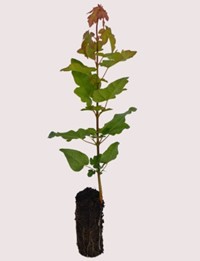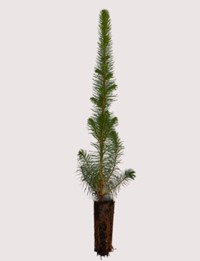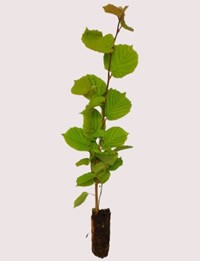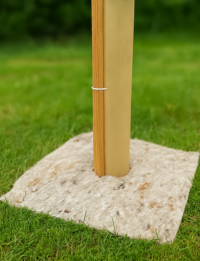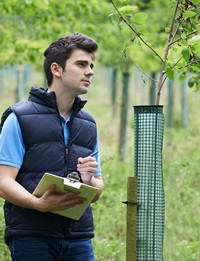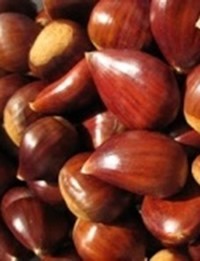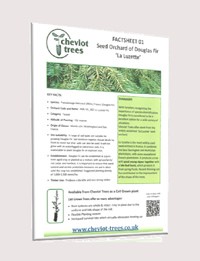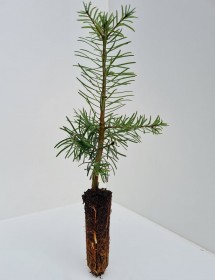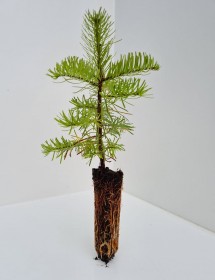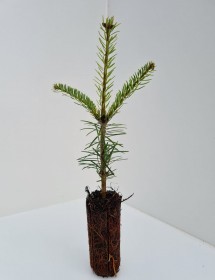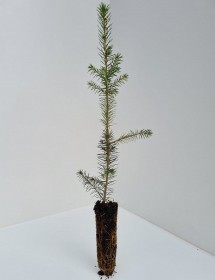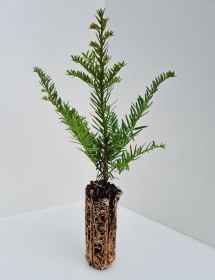
Conifers
At Cheviot Trees in the Scottish Borders, we grow conifer species to suit all planting objectives from commercial timber production, to small woodland and Christmas tree production.
For quality timber production we grow from a wide range of Selected & Improved seed sources. We also grow local provenance seed sources for native or conservation planting projects.
-
Abies alba - European Silver Fir
£1.98from £0.88Abies alba - Silver fir is a long-living conifer upright-growing evergreen conifer with dark green needles that are silver underneath. The yellow-green cones which appear in late spring are cylindrical in shape and ripen to brown.
The strong, lightweight timber is mainly used for construction, furniture, plywood and pulpwood. Young trees are also popular as Christmas trees. Ecologically, the tree is important for maintaining high biodiversity in forested areas. The tree’s deep taproots offering stability, alongside its easily biodegradable needle litter, are key in the establishment and management of silvicultural systems.
Silver fir is shade-tolerant and able to act as a “seedling bank” under the canopy of older dominant trees for decades.
-
Abies fraserii - Fraser Fir
£1.98from £0.88Abies fraserii - Fraser Fir is a fast growing, large evergreen with dark green needles that have a silver grey underside.
Originally from the USA, this species is most frequently planted in the UK for Christmas tree crops as it has a dense, busy habit when young. Fraser Fir has a narrower and more compact shape than Nordmann Fir so is often suited to smaller rooms in houses if it is grown to then be supplied as a cut Christmas tree.
We grow several other species of cell grown conifers which are all suited for Christmas tree production.
-
Abies grandis - Grand Fir
£1.82from £0.81Abies grandis - Grand Fir is a very large and stately evergreen conifer that has a very fast rate of growth.
It is one of several north west American species discovered by the well known plant hunter, David Douglas who sent seeds back to the UK in 1831.
Needles are dark green and grooved on top with two white bands. A very shade tolerant species that is ideally suited for underplanting in continuous cover forestry but it is equally as impressive when grown as a specimen tree.
-
Abies nobilis - Noble Fir
£1.82from £0.81Abies nobilis - Noble Fir is a well regarded evergreen conifer that has a very high tolerance of exposure and it is often planted in the uplands.
It is one of several north west American species discovered by the well known plant hunter, David Douglas who sent seeds back to the UK in 1831.
Needles are blue grey in colour and are upcurved. A popular species for Christmas tree production due to its steady growth, attractive shape, good needle retention qualities and desirable foliage colour.
We grow several other species of cell grown conifers which are all suited for Christmas tree production.
-
Abies nordmanniana - Nordman Fir
£1.98from £0.88Abies nordmanniana - Nordman Fir is the best selling species for Christmas tree production.
It has luscious soft dark green needles, a symmetrical shape, and excellent needle retention qualities.
We grow several other species of cell grown conifers which are all suited for Christmas tree production.
-
Cedrus atlantica - Atlas Cedar
£2.13from £1.03Cedrus atlantica - Atlas Cedar is a large evergreen conifer with silvery blue needles. The branches are horizontal and stiff.
Native to Morocco and Algeria in the Atlas Mountains where it is often grown as a pure stand. It is the only African tree that thrives in the UK, and most of the plants that we produce are used by our customers in the Southern and Eastern areas of the UK, as it is capable of withstanding periods of drought once established.
It produces strong and durable timber that is renowned for its strong and persistent fragrance.
Learn more about Atlas Cedar by reading our factsheet.
-
Cryptomeria japonica - Japanese Red Cedar
£1.82from £0.81Cryptomeria japonica - Japanese Red Cedar is a large evergreen tree with green, dense foliage that turns bronze in Winter.
Introduced into Britain in 1879, the Japanese Red Cedar has demonstrated its ability to produce a yield that is comparable to other commonly used conifers in the UK such as Douglas Fir & Western Red Cedar. It’s expansion into UK is likely to be in areas with a warm, moist maritime climate such as W. Scotland, Wales and SW England.
There is limited experience of processing the timber in the UK but in its native range it is highly regarded as a major construction timber and is also often used in exterior, ground contact applications as the timber has good natural durability.
Learn more on this Fact Sheet.
-
Cuppressocyparis leylandii - Leylandii
£3.64from £1.73Leylandii is a large evergreen conifer that is most commonly utilised for hedging or screening purposes.
Tough, Fast growing and tolerant of most conditions.
The foliage is dense, dark green in colour and flat in shape. We also produce Golden Leylandii.
If you are planting for hedging/screening you may also wish to consider Western Red Cedar. This species is equally as fast growing but has a tighter shape and a richer shade of green.
-
Cupressocyparis leylandii Castlewellan Gold -...
£3.64from £1.73Cupressocypairs leylandii Castlewellan Gold - Golden leylandii is a large evergreen conifer that is most commonly utilised for hedging or screening purposes.
Tough, Fast growing and tolerant of most conditions.
The new growth is strikingly golden yellow in colour. We also produce Green Leylandii.
If you are planting for hedging/screening you may also wish to consider Western Red Cedar. This species is equally as fast growing but has a tighter shape and a richer shade of green.
-
Juniperus communis - Common Juniper
£3.34from £1.47Juniperus communis - Juniper is a small evergreen conifer that is native to the UK.
Small green needles with a prickly point. Juniper is dioecious so the male and female flowers grown on separate plants. Once pollinated by wind the female flowers develop into fleshy purple berries.
The berries are popular for flavouring gin but they are equally favoured birds who eat the berries. Juniper is also an important habitat for small mammals and nesting birds due the dense cover that it provides.
-
Larix decidua - European Larch
£1.46from £0.59Larix decidua - European larch is one of the few deciduous conifers.
It has a lot to offer. It is tough and robust, provides strong durable timber and offers fantastic landscape value in the Autumn when its foliage changes to a golden yellow colour.
Its native range is the mountainous regions in Central and Eastern Europe where it grows well at high elevations. It has grown successfully in the UK since it was introduced in the early 17th century.
The timber is noted for its hardness, strength, and natural durability so it is often used for exterior purposes. The seeds are a tasty treat for red squirrels!
We also produce Hybrid Larch.
-
Larix x eurolepis - Hybrid Larch
£1.46from £0.59Larix x eurolepis - Hybrid Larch is a cross between European Larch and Japanese larch. It is hardier and has a faster growth rate than its parents.
Larch has a lot to offer. It is tough and robust, provides strong durable timber and offers fantastic landscape value in the Autumn when its foliage changes to a golden yellow colour.
Its native range is the mountainous regions in Central and Eastern Europe where it grows well at high elevations. It has grown successfully in the UK since it was introduced in the early 17th century.
The timber is noted for its hardness, strength, and natural durability so it is often used for exterior purposes.
The seeds are a tasty treat for red squirrels!
We also produce European Larch.
-
Metasequoia glyptostroboides - Dawn Redwood
£3.64from £1.73Metasequoia glyptostroboides - Dawn Redwood is a large deciduous conifer which needs plenty of space to reach its full potential.
This ancient species was considered to be extinct until a small group were discovered in China in 1944. Whilst it has been widely planted throughout the world since then it is still carries the endangered status by the IUCN.
It has bright green needles which are light and feathery – quite similar in appearance to Coastal Redwood. The foliage turns to fiery shades of orange and brown in the Autumn which provides a spectacular show of colour.
A great choice for avenue and parkland planting.
-
Picea abies - Norway Spruce
£1.46from £0.59Picea abies - Norway Spruce is one of the most important and widely distributed tree species in Europe.
With the exception of coastal areas it has no climatic limitations throughout the UK so it as been widely planted for timber production plus it has a high ecological value.
Coniferous. Evergreen with sharp, pointed needles that have a rich sweet smell.
The traditional species for Christmas tree production due to its busy habit and attractive scent. It does not have the cut tree needle retention qualities of other Christmas trees species such as Nordmann Fir, however the fast rate of growth and relatively low cost of production still makes it a popular choice – especially for larger display trees.
-
Picea omorika - Serbian Spruce
£1.52from £0.67Picea omorika - Serbian spruce as the name suggests originates from Serbia and is a large evergreen conifer with an alpine appearance.
It is similar to Norway Spruce although it has shorter branches with a downward curve and the crown is much more narrow and pointed.
Evergreen with sharp, pointed needles that have a rich sweet smell. The juvenile cones are purple tinged before ripening to a brown colour.
A very attractive species with a slender columnar habit that is ideal for parkland planting.
-
Picea pungens glauca - Blue Spruce
£1.98from £0.88We grow Picea pungens glauca - Blue spruce primarily for the purpose of Christmas tree production.
It is easy to see why this species is a popular choice. It has the traditional pyramid shape with stiff horizontal branches and a dense habit.
Slower growing then Norway spruce but worth waiting for!
The classic shape combined with attractive blue tinted needles makes it stand out when compared against other species – a premium choice.
We grow several other species of cell grown conifers which are all suited for Christmas tree production.
-
Picea sitchensis - Sitka Spruce
£1.46from £0.59Picea sitchensis - Sitka Spruce is economically important and the backbone of the UK forestry industry. This single species accounts for half of the UK’s commercial plantations.
Introduced to the UK in around 1850 although its use expanded enormously in the 20th century to help increase the UK’s perilously low percentage of forest cover.
Coniferous. Evergreen with sharp, flattened needles.
The dense foliage of Sitka Spruce provides good shelter for large mammals.
We grow our Sitka Spruce from Improved seed source to maximise the future timber yield. The sawn timber is versatile and utilised for many purposes including construction and packaging.
-
Pinus peuce - Macedonian Pine
£1.98from £1.22Pinus peuce - Macedonian Pine is a handsome, upright coniferous tree which can grow to 30m tall. It has a pyramidal growing habit, with glossy young green shoots, showing deep blue-green needle-like leaves up to 10cm long. In the autumn, cylindrical green cones with white resin, each up to 15cm long, are borne on short stalks which ripen to brown later in the year.
The Macedonian Pine is very hardy, tolerating the high mountain alpine tree lines and thrives on free draining soils.
-
Pinus pinaster - Maritime Pine
£1.52from £0.67Pinus pinaster (Maritime Pine) is a fast growing, medium sized conifer native to the Mediterranean. This species is considered as an alternative to some more widely used trees if climate change proceeds as predicted. The best results can be achieved by planting in Southern Britain.
It grows best in lighter, acidic or neutral soils near the sea, but is can also grow on saline soils and very shallow soils.
Maritime Pine has stout evergreen needles in pairs, with attractive bright reddish-brown bark. -
Pinus sylvestris - Scots Pine
£1.46from £0.59Pinus sylvestris - Scots Pine is one of only three conifers native to the UK and our only native Pine. It is the worlds 2nd most widespread conifer after Juniper.
An important species for the UK for economic and ecological reasons.
A large evergreen conifer Scots Pine has long blue green needles that grow in pairs. Male and female flowers grow on the same tree and once the female flowers have been pollinated by wind they turn green and develop into cones. The mature cones are grey-brown in colour.
The redwood timber of Scots Pine is relatively lightweight yet strong and can be easily treated with preservatives to prolong its service life for exterior uses.
-
Pseudotsuga menziesii - Douglas Fir
£1.60from £0.70Pseudotsuga menziesii - Douglas Fir is an evergreen conifer that was named after David Douglas who sent the first seed back from North America to Britain in 1827.
It has soft green needles with two grey bands underneath. Oval shaped cones hang and the bark is an attractive reddish brown colour.
One of the most important timber species in the world and widely planted in the UK, Douglas Fir is fast growing and the timber is strong and durable with few knots.
-
Taxodium distichum - Swamp Cypress
£3.64from £1.73Originally from South Eastern America, Taxodium distichum - Swamp cypress is a narrow, pyramidal conifer with soft green needles that turn attractive shades of orange and red in the Autumn.
On mature trees the bark peels which adds considerable winter interest.
Often confused with either Coast Redwood or Dawn redwood but Swamp Cypress needs a good supply of moisture.
-
Taxus baccata - Yew
£1.93from £1.03Native to the UK, Taxus baccata - Yew is a dense evergreen conifer with small green needles.
Used for hundreds of years in the UK to create hedging, the bright green spring growth matures to a dark green for a classical look. It can be easily shaped and makes an excellent screen for privacy.
It is often perceived to be a slow growing species but it is actually quite fast growing in its juvenile stage.
The normal spacing for hedge planting is around 3 plants per linear metre.
-
Thuja plicata - Western Red Cedar
£1.52from £0.67Thuja plicata - Western Red Cedar is a very useful species and a popular choice with our customers. It is a tall, multi-functional evergreen conifer.
It has flat sprays of sweetly scented green foliage with brown, oval shaped cones.
In the UK Western Red Cedar is planted for timber production and also for hedging.
The highly durable redwood timber is well regarded as it contains a natural preservative with helps to resist fungal attack.
Western Red Cedar is an excellent hedging species as it is evergreen, dense and is easier to manage than other conifer species such as leyandii. If planting for hedging the normal planting density is 3 plants per metre.
-
Tsuga heterophylla - Western Hemlock
£1.52from £0.67A dense and graceful conifer that is conical in habit but with a narrow crown, Tsuga heterophylla - Western Hemlock is fast growing and will ultimately reach a very large size.
Mainly grown for timber although it makes an impressive parkland or arboretum tree.
It is one of several north west American species discovered by the well known plant hunter, David Douglas who sent seeds back to the UK in 1831.
Evergreen with small green needles and pendulous cones that start green and turn to grey brown.

